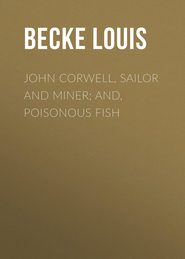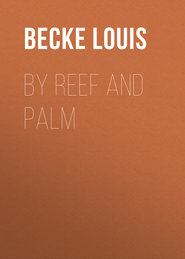По всем вопросам обращайтесь на: info@litportal.ru
(©) 2003-2024.
✖
The Strange Adventure Of James Shervinton
Настройки чтения
Размер шрифта
Высота строк
Поля
“I know she loves you very dearly,” I said, as I rose to return to my house, for just then we saw Niâbon herself coming through the village accompanied by a number of young women.
We left Oraluk with a slashing breeze, which we held for eight days, the boat doing splendid work, and on the morning of the tenth day we sighted Guam, forty miles away, and looming blue against the sky line.
“Three thousand miles,” I cried exultingly, “three thousand miles, Lucia—in fact, nearer three thousand two hundred.”
Her dark eyes filled with tears as she pressed my hand and looked at the home of her childhood, and even Niâbon showed some trace of excitement as she bent her glance upon the great mound of land.
I opened our one remaining bottle of wine which had been reserved for this auspicious day, and we shared it between us, whilst Tepi and Tematau were each given a stiff glass of grog.
“Blow, good breeze, blow,” I cried, “blow steady and strong.”
“Blow, good wind, blow steady and true,” echoed my two men, as I eased off the main sheet, and the boat went faster through the water, and made a seething wake.
As we were so well to windward of the island, I determined to head for Cape Ritidian, its north-west point, as from there I could easily pick up Port Taro-fofo, where, so Lucia assured me, we should find a pilot to take us down the coast to Port San Luis. Not having a chart of the island made it necessary for me to be cautious, but Lucia was quite sure that from Cape Ritidian we should have no trouble in running down the coast to Tarafofo—a port with which she was quite familiar, for she had been there on many occasions with her father. The anchorage was good, and there was a small town at the head of the harbour, where supplies could be obtained.
“That will do us nicely, then,” I said; “we may as well spell there for a few days and get well rested. Oh, won’t it be glorious to feel solid earth under foot once more after the last ten weary days!” “Oh Jim, the very thought of stepping on shore again makes my veins thrill. Oh, the great lovely green mountain forest, and the calls of the birds and the sweet sound of falling water—it is heaven to think of being there, in such a beautiful country after so many, many days upon the sea! Ah, you will love Guam, Jim! You cannot help it—it is the fairest, sweetest land in all the world, I think.”
Her enthusiasm infected me to some degree, and bending forward to her, I whispered,—
“Is there a church at Tarafofo, Lucia?”
A vivid blush dyed her sweet face from neck to brow.
“Yes,” she answered, so softly that I could scarce hear her, “there has always been a church there for a hundred years. It was once plundered and burned by pirates, so one of the priests told me when I was a child.”
The breeze held good with us, and at four in the afternoon we ran in under Cape Ritidian and brought to half a cable away from the shore, which presented an aspect of the loveliest verdured hills and valleys imaginable, fringed with a curving snow-white beach, along which were scattered a few native houses, surrounded by plantations of bananas and papaw trees.
Presently a boat came off manned by natives dressed in very bright colours. They all spoke Spanish and at once offered to pilot us down to Tarafofo Harbour, which, they said, we could enter at any time, day or night; we accepted their services, and they came aboard, veered their boat astern, and by nightfall we came to an anchor in a small, but safe and exceedingly beautiful harbour.
Here more of the country people came on board, late as it was, and pressed us to sleep on shore, telling us that there were some very comfortable houses in the village, which was situated two miles up the Tarafofo river. Then one of the visitors recognised Lucia, and now invitations poured in upon us from all sides, and finally Lucia and Niâbon, accompanied by Tematau, went ashore with them, leaving Tepi and myself on board.
“Good-night, Jim dear,” said Lucia, as she was about to get into the shore boat, “you will come on shore early, won’t you? I don’t like your staying behind, but you and Tepi will perhaps get a good night’s rest now that three of us will be out of the way. I should never go to sleep if I stayed on board to-night. I am so excited.”
I stooped and kissed her little upturned face, and in another moment she was in the boat, which at once pushed off into the darkness and made for shore.
“Good-night, again,” both she and Niâbon cried, and Tematau also called out Tiâkâpo!
“Good-night, good-night,” I shouted, swaying our boat lantern in farewell. “Tiâkâpo, Tematau. May you all sleep well.”
They made some merry laughing response, in which they were joined by their hosts, and then Tepi and I were alone.
We put on the cabin hatches, spread out our sleeping mats and made ourselves comfortable for the night, and after half an hour’s smoke, we fell asleep too tired to talk.
À little after midnight the cool breeze suddenly died away, and both Tepi and myself awoke almost at the same moment.
“The air hath grown hot, and is hard to breathe, master,” said the big man “I fear a storm is near.”
It had indeed become very hot and stifling, but on looking at the barometer, I saw there was no change, and so felt no concern, for we were in an excellent position, no matter how hard, and from where it might blow. In half an hour or so, a few heavy splashes of rain fell, then a sudden shower, which necessitated us lifting off the hatch and going into the cabin, and it was then that Tepi complained to me of a severe headache, from which I was also beginning to suffer.
I had just struck a match to take another look at the glass, when suddenly the boat began to tremble violently, and then gave such a sudden jerk at her cable that I fell forward on my face.
“Mafuie! Mafuie!” (“Earthquake! earthquake!”) cried Tepi in terror-stricken tones, as he clutched the coamings and looked seaward. “Oh, Simi, look, look! The sea, the sea! We perish!”
May God spare me from ever seeing such another sight! A black towering wall of water was rushing towards the boat, and ere I could frame my lips to utter an appeal for mercy to the Almighty it was upon us, and lifting us up on the summit of its awful crest, hurled us shoreward to destruction. Then I remembered no more.
Two weeks later I awoke to life and misery in a wide, low-ceiled room. Tepi, with his arm in a sling, was bending over me, and sitting beside my bed were two padres.
“Where am I, good fathers?” I asked.
“In San Ignacio, my son,” replied the elder of the two. “God has spared you and this Indian sailor of yours to render thanks to Him and the Holy Virgin for His mercy.”
“And where are my friends—the two girls and Tematau? Tell me, Tepi! Tell me,” I said, with a dull terror at my heart. “Why do you shake and hide your face?” Then I turned to the priests.
“For God’s sake, tell me, gentlemen,” and I clutched the hand of the one nearest to me.
“In Paradise, my son. They and three hundred other poor souls rendered up their lives to God thirteen days ago. Scarcely a score of people in Tarafofo escaped.”
The shock was too much for me, and I fell back again.
As soon as I was strong enough for the journey I visited the scene, and was shown, on the spot where once the church had stood, a bare, grim mound. Underneath it lay all that was mortal of Lucia, Niàbon, Tematau, and three hundred others, who had in one swift moment been sent to eternity that dreadful night. Some of the few survivors, who, under the direction of a priest, and the Governor of San Ignacio, were erecting a tall wooden cross at the foot of the great grave, led me to the site of the house in which my dear companions had met their deaths. Nine other people were in the house when it fell and buried the sleepers, and the agony must have been short for them all.
The tidal wave which accompanied the earthquake had hurled the boat and Tepi and myself for many hundreds of yards inland. I was picked up in the boat herself, stunned and severely injured. Tepi was carried into a rice field, and although his arm was broken, he at once set out in search of me, and the faithful fellow had come with me when I was carried in a bullock cart to San Ignacio, where the doctor and priests had brought me round after two weeks’ dangerous illness.
Before leaving Guam I spent two months with my friend José Otano, who tried hard to make me stay with him. At his house poor Lucia’s heart-broken sister came to see me very often, and I bade her farewell with genuine sorrow.
Then one day Tepi and I turned our faces once more to the islands of the south—and so the story of my strange adventure is told.
notes
1
Jim—pronounced Seemee.
2
Whalemen’s parlance for gossip.











